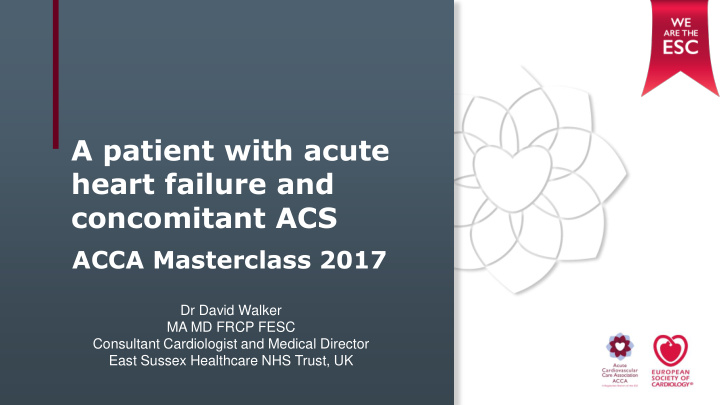



A patient with acute heart failure and concomitant ACS ACCA Masterclass 2017 Dr David Walker MA MD FRCP FESC Consultant Cardiologist and Medical Director East Sussex Healthcare NHS Trust, UK
Presentation • 42yo man • Admitted just before midnight, acutely short of breath with chest tightness • Unwell for 2 months previously • Chest tightness on exertion • Worsening SOB on exercise • Intermittent palpitations
PMH • Chronic obstructive pulmonary disease • TB many years ago • 2 previous pneumothoraxes (drained) • No family history of heart disease • 4-5 pints beer/day (70 units/week) • Ex-smoker (40/day, stopped 5 years ago)
Medication • Phyllocontin forte 400mg bd • Inhalers • Salbutamol • Seretide 250 • Spiriva
Examination SOB at rest • Not cyanosed • RR 26/min • HR 170/min irregular (atrial fibrillation) • BP 110/60 • JVP +6cm • HS normal • Basal fine inspiratory crackles bilaterally with widespread • wheeze
ECG
CXR
Blood Results • ABG on admission (room air) • pH 7.4, pO2 9.2, pCO2 3.8, Sats 92%
Initial Management • Medical assessment unit made a diagnosis of “AF with rapid rate response causing LVF” • IV Furosemide 40mg • No Beta blocker in view of history of asthma • Central line placed and IV Amiodarone commenced • Anticoagulated with Enoxaparin 1.5mg/kg • Transferred to CCU for further management
CCU Ward round (day 2) Minimal improvement in HR (160/min) • Cold and clammy • RR 36, BP 129/112 • U+E unchanged, ALT 3307, INR 1.6, CRP 18 • On 28% FiO2:- • • pH 7.29, pO2 14.9, pCO2 3.3, HCO3 12.0, BE -12.6 Chest: Very wheezy, bilateral crackles • Digoxin added (IV as unable to take orally) • Urgent bedside echocardiogram •
Echo (1)
Echo (1)
Echo (1)
Ongoing management (day 2) Globally poor LV function • • ? Ischaemic (no RWMA) • ? Alcoholic, • ? Rate related, • (?? Coronary embolus) Further IV furosemide (80mg) • First dose Ramipril 1.25 mg given • BP fell 90/50, felt faint, but still passing urine •
VF arrest 2248h
Ongoing management (day 2) VF arrest 2248hrs • 1x 150J biphasic shock • Reverted to sinus rhythm at 122/min • BP low (85/55) • Repeat hand held echo in Sinus Rhythm - still poor LV • function Resident discussed with me at home as he wanted to • contact Harefield for transplant assessment • Continue Amiodarone IV • Repeat K low 3.2 – replaced IV centrally • Ivabradine added 5mg bd (no BB as still v wheezy)
CCU day 3 By mid afternoon HR 70, BP 108/75 • Passing urine – U&E stable • Clinically much improved, less SOB • Normal RR, less wheezy, fewer crackles • Repeat ECG – widespread T wave inversion • Ramipril 1.25mg od continued • Ivabradine increased to 7.5mg bd • Listed for coronary angiography •
ECG day 4
Coronary angiography day 4
PCI LAD/Cx/RCA (day 6)
Ongoing management (day 6) • HR 60, BP 110/70 • Chest clear! • Abnormal LFTS normalised • Ramipril 2.5mg od, Furosemide 40mg od, Eplerenone 12.5mg od, Ivabradine 7.5mg bd, Aspirin 75mg od, Clopidogrel 75mg od • Repeat echocardiography
Repeat Echo day 6
Repeat Echo day 6
Repeat Echo day 6
Progress • Discharged day7 • CT chest as out patient • Beta blocker commenced as OP(no wheeze) • Furosemide stopped • Very well at 3 and 6 month FU • Reformed character – has given up alcohol!
ECG at Follow up
Discussion points • Early DC Cardioversion (before the cardiac arrest)? • Use of Digoxin acutely • Significance of modest Tn rise in AF with rapid HR • Off-label use of Ivabradine in the acute heart failure patient with hypotension and sinus tachycardia • Role for IABP at any stage?? • What was the cause of the LV dysfunction • ? Excessive HR combined with 3 vessel disease • Only very small hsTnT rise (52) • ? Any contribution from excess alcohol (cause of AF?) • Very rapid recovery suggests acute myocardial stunning
CT – lung apices
Recommend
More recommend